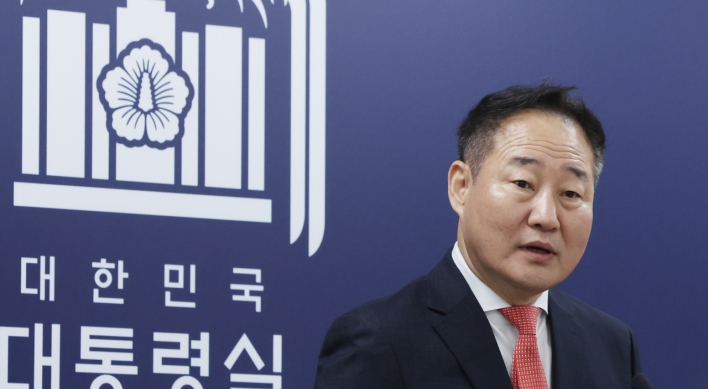It is alarming that a wave of strikes is hitting broadcasting networks where reporters and program directors are protesting against their managements, which they claim have colluded with government authorities to suppress fair reporting.
Reporters at Yonhap News, the only national news agency, also joined in the strikes in which the media employees demand the departure of their presidents.
At MBC, some 700 reporters and producers are on strike since Jan. 30. They say that the independence of the broadcaster has been lost as company president Kim Jae-chul takes orders from the Blue House on the making of news and other programs.
The company took stern action against the protesting employees as they refused to comply with an order to return to work by Feb. 27. Two union leaders were fired, eight were suspended and 16 were filed against for criminally obstructing business. The confrontation escalated as 166 reporters decided to resign en masse.
Some 200 reporters at KBS went on a strike Tuesday morning, demanding the resignation of company president Kim In-kyoo and cancellation of the punishment of 13 union staff who had led an earlier strike in July 2010. Reporters at the YTN news channel and the Yonhap news agency have decided to go on strike after union votes. Their presidents were urged by the protesters to step down for their alleged meddling in news programming at the behest of government authorities.
MBC, KBS, YTN and Yonhap have different corporate structures, but the government, with direct or indirect involvement in their management systems, can exercise a degree of influence in the appointment of their CEOs. Inside monitors in these media organizations have recently raised questions about outside interference in news reporting. Unionized reporters are expressing fear of a return to the media manipulation that existed under authoritarian rule.
However, both the Blue House and executives at the respective broadcasters deny any collusion and assert that broadcast journalists are too paranoid during the sensitive election period. Whichever side may be right, mutual distrust between management and employees at the broadcasters has reached extreme heights.
Managers at terrestrial broadcasters have been on the alert as the newly licensed comprehensive programming cable channels have been recruiting personnel from the existing networks since last year. The entry of these new channels has shaken the broadcasting market and the current unrest in the TV studios seems not unrelated to the so-called media “big bang.”
Strikes at the broadcasters and news agency will seriously compromise the rights of their audiences. The opposing sides should seek to address their differences through dialogues, and their governance and management systems should be amended if necessary so that these media outlets will be saved from the perennial turbulences witnessed each time new CEOs were appointed.
Reporters at Yonhap News, the only national news agency, also joined in the strikes in which the media employees demand the departure of their presidents.
At MBC, some 700 reporters and producers are on strike since Jan. 30. They say that the independence of the broadcaster has been lost as company president Kim Jae-chul takes orders from the Blue House on the making of news and other programs.
The company took stern action against the protesting employees as they refused to comply with an order to return to work by Feb. 27. Two union leaders were fired, eight were suspended and 16 were filed against for criminally obstructing business. The confrontation escalated as 166 reporters decided to resign en masse.
Some 200 reporters at KBS went on a strike Tuesday morning, demanding the resignation of company president Kim In-kyoo and cancellation of the punishment of 13 union staff who had led an earlier strike in July 2010. Reporters at the YTN news channel and the Yonhap news agency have decided to go on strike after union votes. Their presidents were urged by the protesters to step down for their alleged meddling in news programming at the behest of government authorities.
MBC, KBS, YTN and Yonhap have different corporate structures, but the government, with direct or indirect involvement in their management systems, can exercise a degree of influence in the appointment of their CEOs. Inside monitors in these media organizations have recently raised questions about outside interference in news reporting. Unionized reporters are expressing fear of a return to the media manipulation that existed under authoritarian rule.
However, both the Blue House and executives at the respective broadcasters deny any collusion and assert that broadcast journalists are too paranoid during the sensitive election period. Whichever side may be right, mutual distrust between management and employees at the broadcasters has reached extreme heights.
Managers at terrestrial broadcasters have been on the alert as the newly licensed comprehensive programming cable channels have been recruiting personnel from the existing networks since last year. The entry of these new channels has shaken the broadcasting market and the current unrest in the TV studios seems not unrelated to the so-called media “big bang.”
Strikes at the broadcasters and news agency will seriously compromise the rights of their audiences. The opposing sides should seek to address their differences through dialogues, and their governance and management systems should be amended if necessary so that these media outlets will be saved from the perennial turbulences witnessed each time new CEOs were appointed.
-
Articles by Korea Herald





![[K-pop’s dilemma] Can K-pop break free from ‘fandom’ model?](http://res.heraldm.com/phpwas/restmb_idxmake.php?idx=644&simg=/content/image/2024/05/09/20240509050541_0.jpg&u=20240509173751)




![[News Analysis] Yoon's first 2 years marked by intense confrontations, lack of leadership](http://res.heraldm.com/phpwas/restmb_idxmake.php?idx=644&simg=/content/image/2024/05/09/20240509050612_0.jpg&u=20240509233252)








![[Today’s K-pop] NCT’s Mark to drop 1st solo album in February 2025](http://res.heraldm.com/phpwas/restmb_idxmake.php?idx=642&simg=/content/image/2024/05/10/20240510050597_0.jpg&u=)